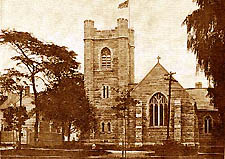June 1907
Brooklyn Standard Union
"Castle William
Everyday life of the military prisoners confined there"
Of late years there have been an unusual number of escapes from the old prison,
which have been planned and carried out in the face of tremendous odds. . . .
Castle Williams itself is an imposing structure . . . It is circular in shape, with a
large garden in the center, above which is flanked two rows of cells. The garden is
covered with closely cut grass and decorated with pyramids of cannon balls. . . .
The ground floor of the castle is used entirely for offices of the prison sergeant,
the dining room, the carpenter shop, laundry, bake shop and kitchen. . . .
The cells throughout are heated by steam and lighted by electricity.
The baths are in excellent condition, and the prison fare, which is always wholesome,
is made a special feature at holiday festivities.
The menu for each meal is posted on the dining room wall and the following is a sample
of the every day fare.
"Menu: Breakfast -- Fried bacon, fried potatoes, bread and coffee.
"Dinner -- roast young pork, brown gravy, mashed potatoes, mashed
turnips, rice pudding, with milk and eggs.
"Supper -- Baked pork and
beans, pickles, bread and coffee."
. . . prisoners eat in first
and second calls to mess. The kitchen is a continuation of these
rooms and the bake shop opens off the kitchen.
When a prisoner enters Castle Williams, he is asked what trade or occupation he
pursued prior to entering the army and he is then put to work in a position in which
he can do the most good with his time
to serve.
The overseer, Sergeant Lorenzo Bell, lives in the prison and his office work
is creditably transacted, bookkeeping and clerical work being done with the accuracy
and despatch that obtain in large legal concerns anywhere, and all this efficiency
is the work of the prisoners. There are carpenters who are at present turning out
furniture which is used only by officers at the military post; there are shoemakers
who are skilled in their trade; tailors who are put to work on the prison clothing;
and each one at his trade as in some big industrial school.
For the most part, the men are set to work about the grounds of the reservation
and some of the boys are at work in the officers' homes. There are 235 at the prison
at the present time and the great common cause of their desertion is drink.
Whenever the prisoners show rebellion to the order of discipline they are put
to work on the rock pile and a few of the obstreperous ones are confined to the
solitary cells or dungeons on the top terrace, which are reached by a winding
stair, in the tower.
The general cells are all built large enough to furnish twelve beds and are
perfect in ventilation and sanitation. Each cell opens upon the inner garden,
in true Spanish fashion.
Each prisoner is furnished with a roughly made cupboard for books and clothes
and the little keepsakes from home, and are all well decorated with photographs.
Castle Williams is now the proud possessor of a military prison band that practices
regularly every evening and frequently gives concerts on the grounds.
On Sunday the prisoners in a body attend the services at the The Chapel of St. Cornelius.
an Episcopal Church at 3 P.M., and enter into the song services with keen
enjoyment. They are not compelled to attend church but do so voluntarily,
and the close communion which exists between Chaplain [Edmund Banks]
Smith and the prisoners has helped to make many a hard place smooth.
There are stories of hardships, severe discipline and suffering
that only a sympathetic servant of God can relieve, and thus many
of these soldiers who have served with military distinction are reconciled
to the life made melancholy by what might have been.
When the prisoner has served his time, allowing a deduction for
good behavior, he is given a new suit of clothes and $5 when he
leaves Castle Williams.
Return to COURT MAIN
Return to CIVIL MAIN
Return to Newspaper: BROOKLYN STANDARD UNION MAIN
Return to BROOKLYN MAIN

